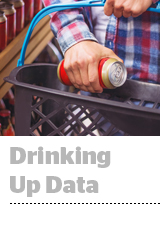 Buying beer online may be uncommon, or downright illegal in some states, but that isn’t stopping Anheuser-Busch from investing heavily in ecommerce.
Buying beer online may be uncommon, or downright illegal in some states, but that isn’t stopping Anheuser-Busch from investing heavily in ecommerce.
Except, with beer such a poor ecommerce converter, the world’s largest beer brewer is focusing on merchandise and apparel to generate online sales and shopper data.
Branded merch is insignificant compared to beer sales, but for Anheuser-Busch the real value of an ecommerce business comes from the data, not the revenue, said John Faviano, director of demand management and integrated marketing technology.
“My bosses and everyone here loves the transactional data and sales lift visibility you get from that,” Faviano said. “In that sense it’s an important part of us shifting to a more consumer-centric business.”
Previously, individual AB InBev brands like Budweiser, Busch or Michelob would develop online storefronts for individual campaigns or sponsorships, but those shops didn’t perform well and didn’t aggregate data. Each store collected such meager data that it wasn’t contributive. Now the brand is ramping up its cloud commerce capabilities to increase and centralize shopper data.
AB InBev has worked with Adobe for five years and with Magento for the past three, even before Adobe acquired the ecommerce tech company for $1.7 billion last year. When it used to sell branded gear on a campaign-by-campaign basis, the company couldn’t recognize return visitors or tie the conversions into its audience and marketing stack.
With its new online “Shop Beer Gear” store and the consolidated commerce platform, Faviano said the brand marketers get better metrics, like driving traffic to the store or getting a consumer to add something to an online cart. Merchandise sales in the first quarter of 2019 have already exceeded all of last year, he said, pumping more data into the ecommerce engine.
AB InBev can also use its centralized sales data more effectively across the brand portfolio. For instance, Bud Light is the biggest NFL sponsor, and NFL-branded items that sell well could help segment audiences or provide research data for the company’s other sports marketing deals.
The ability to re-engage ecommerce visitors and create audience segments is also pushing forward the company’s direct-to-consumer marketing evolution, Faviano said. Analyzing site visitors was never a priority before, with beer sales all going through retailers and liquor stores that don’t return customer data to the brands.
But AB InBev’s ecommerce investments will become even more valuable to the marketing team. Right now, the Shop Beer Gear store carries only AB InBev branded items, but eventually licensing partners in sports and entertainment could feature products in the shop and put paid media behind it, adding a new revenue line to the ecommerce business. And starting next month the company plans to integrate the ecommerce drive with two of its loyalty programs.
The ecommerce data reshapes Anheuser-Busch’s marketing in indirect ways as well. The company is increasing its search budget because the online store and new funnel conversions like add-to-cart help prove how SEO lifts sales, Faviano said. “With the consolidated store and ecommerce effort, we have much stronger visibility into things that maybe didn’t seem so critical but now we’re seeing they help keep up with impulse buying.”
This post was syndicated from Ad Exchanger.


More Stories
LUMO expands sales team with three new hires
Friday, March 7 Evening Cable News Ratings: Rachel Maddow Sweeps the Week for MSNBC
Tegna Names John Treviño GM of WKYC in Cleveland